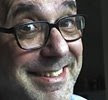Being in New York during CES means not having to blog, "I'm sitting in an airport waiting to go to CES," "I'm standing in a taxi line in Las Vegas," "I'm waiting to get into the Bill Gates Keynote," "I just drooled on a piece of silicon." Unfortunately, it means I have to read all those posts.
But it also means I could stroll up to the Metropolitan Opera to see Julie Taymor's production of Mozart's hokey and transcendant musical comedy,
The Magic Flute. (Her most widely-known credit: she staged
The Lion King for Broadway. As for the rest, you could
Google it up for yourself. But they'll just send you to
Wikipedia.)
What an inspiration to give Taymor this assignment. Between her costumes, the puppets she designed with Michael Curry, and plexiglas palaces designed by George Tsypin, there's more magic in this production than I've ever seen before. About the same amount of flute, though. (Oh, and when I say, "puppets," I'm not talking Bert and Ernie here. It's more on the scale of Thanksgiving parade balloons.)
There are treats in Mozart's score that will knock your socks off. Thankfully, it was warm in New York, so I didn't mind walking home without socks. The music ranges from happy, folky tunes, to soaring chorales, to a "holy f*ck, did those sounds actually come out of a human throat?" explosion by the Queen of the Night in Act II. (It goes to F above high C. Mozart wrote it for his sister-in-law.)
As for the staging: Dignity? You got it. Slapstick? You got it. "Keep it gay" prancing? You got it. Pageantry, thrills, spills, puppetry, flying birds of all sizes, goofy lust, true love, honor, sacrifice, a fat suit, little boys with long white beards, thunder, lightning. What a glorious mish-mash.
What Mozart and Schikandeder have captured is the essential truth about the human condition: We're all nasty, little meat-sacks who want nothing more than to eat, get drunk, and have sex. We're petty, jealous, very easily distracted, and we fall asleep at the most inconvenient moments. Yet at the same time, we aspire to honor, love, loyalty, brotherhood and selfless devotion. No wonder the piece is a mish-mash. It's about us.
Amazingly, it all hangs together. And if we don't hang together, we'll all hang separately. But enough about Saddam.
The cast I saw was first rate. They do it all: Singing, acting, prat falls: everything you want in the theatre. They even show some skin.
And here's the best news of all. If you're within the sound of my voice, you, too, can see this masterwork thanks to the Met's new program of nationwide HDTV theatre transmissions. It's January 23, 1:30 PM Eastern, 10:30 Pacific. Live from New York, it's a Saturday matinee.
Look for it at a
Theatre Near You. Take the kids. Take the parents. Just don't take my seat. I'm goin' again.
For an actual review by someone who knows what he's talking about, read
Alex Ross in The New Yorker. (He liked it too.)
(
Tags:
Mozart,
Opera,
The Magic Flute,
Taymor,
Julie Taymor,
Met,
Metropolitan Opera,
Music,
Theatre,
Musical Comedy)
Trivia question for the oldsters: name two Miltons who worked for Texaco.





